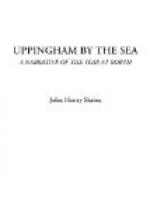For an hour the narrow ridge on which the village stands was swept by a storm of foam, while, from moment to moment, a wave exploding against the crest of the ridge, would leap in through the intervals between the houses, and carrying along a drift of sea-weed and shingle, splintered timber, and wrecked peat-stacks, go eddying down into the drowned pastures beyond. Yet when the ebb came, and men began to count their losses, there were but few to record. The embankment at the south end of the village had been beaten flat, and the road behind it buried under a silt of shingle; the nearest houses to it had been flooded and threatened with collapse, so that the owners were offering them next day on easy terms; from our hospital, which stood in this quarter, the one patient and his nurse were rescued on the backs of waders; the foundations of a chapel, which was building on lower ground, were reported sapped, and a staunch Churchman of our Welsh acquaintance stood rapturously contrasting the fate of the conventicle with the security of his own place of worship on the neighbouring knoll. “If Borth goes, the church won’t, anyhow!” he cried, in self-forgetting fervour. No lives were lost, though several were barely saved. One of our party rescued his dog, already straining at his chain to escape a watery grave; another saved (dearer than life itself) his favourite violin. A fisherman, surprised in his kitchen, was flung down and nearly strangled between door and doorpost by the rush of a wave through the window. A neighbour was drifted out of his house on the top of one wave, and scrambled back to find the door slammed and held against him by another. Rueful groups of women stood in the street, sobbing over armfuls of what one feared might be drowned infants, but were, in fact, the little pigs which they had plucked alive and remonstrant from the flooded styes. In short, if many were frightened, few could plead to being hurt.
Meanwhile, the boys had found their way from the class-rooms upon bridges of railway-sleepers requisitioned from the station-yard. We could not but enjoy that “something not altogether unpleasing to us in the calamities of our neighbours,” but the “humorous ruth,” with which we contemplated the comical incidents of the disaster was exchanged in good time for practical pity. There was to be another high tide that evening, and how would the village stand this second storm of its broken defences? So the order was given to assemble in the street after dinner, and work at the repair of the breaches. The street looked like an ant-hill, as the workers, divided into gangs by houses, with the housemaster at the head of his gang, swarmed on the roadway, clearing it from the debris with pickaxe, spade, and a multitude of hands; re-stacking the cottagers’ store of peat-sods, which the waves had sown broadcast; forming chains across the beach to pass up from hand to hand the large pebbles at low-water mark, to build




